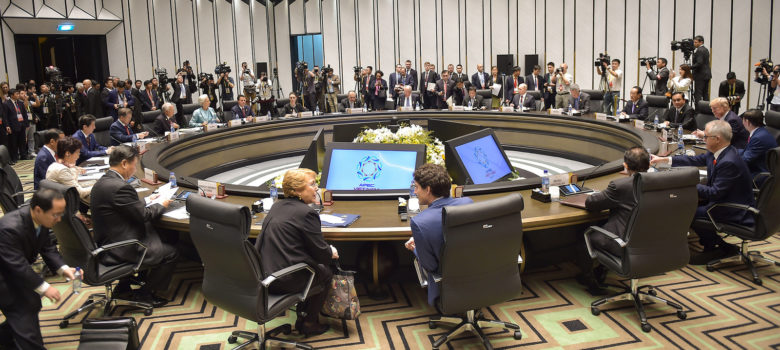In the months following the conclusion of the Trans Pacific Partnership, critics pointed to many specific problems in the text with respect to intellectual property, culture, privacy, and dispute resolution. TPP defenders consistently dismissed those concerns, yet last week’s successful Canadian demand to suspend many of the most problematic IP provisions (along with holding out for reforms to the cultural exemption) confirms that the government has recognized the validity of the criticisms. The government may yet cave to U.S. pressure in the NAFTA renegotiation, but it has established a clear position on culture and IP that better reflects the national interest.
For example, as part of my 50 day Trouble with the TPP series, I pointed to a surprising shift in Canadian trade policy with respect to culture. While Canada had long insisted that the cultural industries receive a full exemption, the Conservative government had agreed to important exceptions to that general rule in the TPP. Buried in Annex II of non-conforming measures were two exceptions to the cultural exception that could be used to block efforts to create mandated Cancon contributions for foreign providers or regulatory restrictions on foreign audio-visual content. Leaving aside whether these would be “good” policy measures, I argued that they did not belong in a trade agreement. While some disagreed (I responded here), the government’s insistence that it will not agree to the CPTPP without addressing the cultural issue validates the concerns, suggesting that policy makers recognize what is obvious from the wording of the text, namely that the TPP would restrict Canadian cultural policy.
The same is true for the TPP copyright and patent provisions. TPP supporters have frequently sought to downplay the significance of copyright term extension, the loss of flexibility on technological protection measures, patent term extension, and fixing the minimum standard for biologics protections. In fact, those provisions extend far beyond international treaty requirements and restrict the ability for countries to tailor their intellectual property laws consistent with those global rules. While the U.S. has been a longstanding proponent of exporting its IP laws, other countries have had strong misgivings about the approach. The Conservatives were willing to cave on these issues during the TPP negotiations, but the Liberal decision to demand suspension of those provisions – which garnered agreement from other TPP countries – demonstrates the quiet opposition to more restrictive copyright and patent rules. Far from being out-of-step with our trading partners, Canadian policy preferences are actually widely shared with many other countries.
The big question is what comes next. On the TPP11 (or CPTPP), the remaining countries have agreed to give everyone an effective veto power with respect to new entrants. Therefore, rather than being used as an incentive to entice the U.S. back into the deal, it may be difficult for the U.S. to convince all remaining countries to unanimously support an end to the suspended provisions. Even if one holds out, the provisions remain suspended.
The TPP11 outcome also confirms – yet again – that there is simply no need for excessively restrictive IP rules in modern trade agreements. The TPP11, the Canada – South Korean trade agreement, and CETA all feature robust IP chapters but do not include provisions such as mandatory copyright term extension beyond international treaty requirements. The NAFTA negotiations, however, will represent a much more difficult challenge as the U.S. is likely to re-assert TPP-style demands in that agreement. Canada may have a tougher time fending off U.S. pressure given the myriad of contentious issues – some reports suggest that IP will be an area to deal if the U.S. compromises on other issues – but its TPP position highlights that politicians and policy makers recognize that extending the term of copyright or patents and limiting future IP and cultural policy flexibility is not in Canada’s national interest.








Pingback: Closed by Default: Why is Prime Minister Trudeau Using Restrictive Terms for Flickr Image Use? - Michael Geist